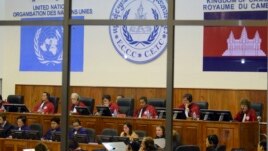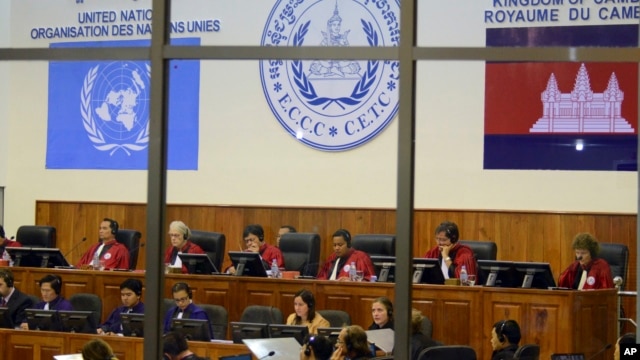Reparation Measures for Khmer Rouge Victims Approved
22 June 2013
WASHINGTON DC - The Cambodian government has approved collective reparations for victims of the Khmer Rouge who have taken part in atrocity crimes trials at UN-backed tribunal.
Reparations will include a national commemoration day, the preservation of crime sites, and the construction of a museum, library and monument, according to a letter obtained by VOA Khmer.
The request was made to Prime Minister Hun Sen by lawyers for civil party participants at the tribunal, Elisabeth Simonneau Fort and Ang Pich.
In it, they ask that May 20 be set aside as a day of commemoration, and that historical Khmer Rouge documents be incorporated into school curriculum from grades 7 through 12, as well as in higher education.
In response, Hun Sen approved the request, which was then approved by the Council of Ministers. Subdecrees will be issued to relevant ministries and authorities to carry out the request, according to official documents.
Court observers cautiously welcomed the initiative.
Nushin Sarkarati, a legal official at the Center for Justice and Accountability, said the tribunal also must consider the needs of victims as it decides on atrocity crimes cases.
“Therefore, the court must consider, what are the harms that victims of forced evacuation have endured?” she said. “How are these harms continuing today? An adequate reparation would address these questions and provide some measure of redress and reparative justice for the victims.
Many of the victims continue to suffer from physical and psychological pain as a result of Khmer Rouge atrocities, she said. “An adequate reparation would be both medical and mental health services to address these continuing harms.”
Education and memorialization have been requested by victims who “continue to search for answers,” she said. “These reparations will help address that need.”
Ear Sophal, a Cambodian-American scholar and author of "Aid Dependence in Cambodia: How Foreign Assistance Undermines Democracy." He filed his own complaint at the court and said he will wait to see the details of the reparations. For example, it remains to be seen how Khmer Rouge documents will be taught in school, he said.
“If an organization like the Documentation Center of Cambodia were to review this and put its stamp of approval on it, then I would agree that it would be at least independently reviewed,” he said.
The preservation of Khmer Rouge crime sites would be better than selling them off to private companies, he said.
However, the reparations, including the date of a commemoration day, must not be politicized by authorities or the ruling Cambodian People’s Party, he said. “It’s very important that this be a date for the victims, and not for political purposes.”
May 20 is already marked as a “Day of Anger” for the atrocities of the Khmer Rouge, celebrated generally by the CPP and its supporters.
Ear Sophal, who lost his father and brother to the regime, also admitted that reparations are a tricky matter. Clear justice from the courts, without politics or corruption, would be a step in the right direction, he said.
Other complainants, like Khmer Rouge survivor Sum Rithy, say these initiatives should also include personal reparations to each victim. That could be something like a certificate clearing them of crimes levied by the Khmer Rouge, he told VOA Khmer.
Meanwhile, the court continues in its atrocity crimes trial of senior leaders Nuon Chea and Khieu Samphan, who have been charged with war crimes, including genocide.
Any decision on reparations made by the court would come after the conclusion of that trial. A tribunal spokesman said a verdict could be reached in that case in the first quarter of 2014.
Reparations will include a national commemoration day, the preservation of crime sites, and the construction of a museum, library and monument, according to a letter obtained by VOA Khmer.
The request was made to Prime Minister Hun Sen by lawyers for civil party participants at the tribunal, Elisabeth Simonneau Fort and Ang Pich.
In it, they ask that May 20 be set aside as a day of commemoration, and that historical Khmer Rouge documents be incorporated into school curriculum from grades 7 through 12, as well as in higher education.
In response, Hun Sen approved the request, which was then approved by the Council of Ministers. Subdecrees will be issued to relevant ministries and authorities to carry out the request, according to official documents.
Court observers cautiously welcomed the initiative.
Nushin Sarkarati, a legal official at the Center for Justice and Accountability, said the tribunal also must consider the needs of victims as it decides on atrocity crimes cases.
“Therefore, the court must consider, what are the harms that victims of forced evacuation have endured?” she said. “How are these harms continuing today? An adequate reparation would address these questions and provide some measure of redress and reparative justice for the victims.
Many of the victims continue to suffer from physical and psychological pain as a result of Khmer Rouge atrocities, she said. “An adequate reparation would be both medical and mental health services to address these continuing harms.”
Education and memorialization have been requested by victims who “continue to search for answers,” she said. “These reparations will help address that need.”
Ear Sophal, a Cambodian-American scholar and author of "Aid Dependence in Cambodia: How Foreign Assistance Undermines Democracy." He filed his own complaint at the court and said he will wait to see the details of the reparations. For example, it remains to be seen how Khmer Rouge documents will be taught in school, he said.
“If an organization like the Documentation Center of Cambodia were to review this and put its stamp of approval on it, then I would agree that it would be at least independently reviewed,” he said.
The preservation of Khmer Rouge crime sites would be better than selling them off to private companies, he said.
However, the reparations, including the date of a commemoration day, must not be politicized by authorities or the ruling Cambodian People’s Party, he said. “It’s very important that this be a date for the victims, and not for political purposes.”
May 20 is already marked as a “Day of Anger” for the atrocities of the Khmer Rouge, celebrated generally by the CPP and its supporters.
Ear Sophal, who lost his father and brother to the regime, also admitted that reparations are a tricky matter. Clear justice from the courts, without politics or corruption, would be a step in the right direction, he said.
Other complainants, like Khmer Rouge survivor Sum Rithy, say these initiatives should also include personal reparations to each victim. That could be something like a certificate clearing them of crimes levied by the Khmer Rouge, he told VOA Khmer.
Meanwhile, the court continues in its atrocity crimes trial of senior leaders Nuon Chea and Khieu Samphan, who have been charged with war crimes, including genocide.
Any decision on reparations made by the court would come after the conclusion of that trial. A tribunal spokesman said a verdict could be reached in that case in the first quarter of 2014.



